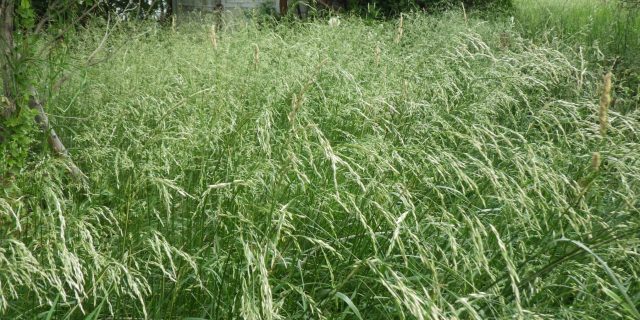15
Feb
Glyphosate Weed Killers Reduce Crop Yields and Hamper Climate Mitigation Efforts

(Beyond Pesticides, February 15, 2023) Glyphosate use in grassland pastures reduces crop yield and impedes climate change mitigation, finds two studies (1,2) published this month from the University of Turku, Finland. While massive public relations campaigns by the agrichemical industry have poured in millions of dollars to convince politicians and the public that pesticides are necessary to ‘feed the world’ and address the climate crisis, the data does not support these claims. “Only in recent years, we have started to realise that intensive agriculture and agrochemical pollution in fact contribute to a reversal of the intended purpose. Soils are polluted with pesticides and at the same time, extreme weather events erode soil nutrients,” says study coauthor Benjamin Fuchs, PhD.
Researchers approached their investigation through two separate experiments on the grass Festuca pratensis, an important forage crop grown for grazing animals throughout the world. The first experiment was conducted in an enclosed greenhouse, while the second took place in a field setting. For both experiments, plots were separated between glyphosate-sprayed and unsprayed controls. All plots received three different approaches to cutting the grass: one group that was intensely cut to two inches (5cm), the second group cut to six inches (15cm), and the third group remained uncut. To determine effects, scientists measured total root biomass and total yield. For the greenhouse experiment, plant chlorophyll and shoot (above-ground plant material, not including roots) biomass was also recorded separately.
For all experiments and plot variables, none saw glyphosate use have a positive impact on yield or biomass. For the greenhouse experiment, shoot biomass was lowest in grasses cut intensively and those growing in glyphosate-sprayed soils. In general, the more frequently the grass was cut, the larger the reduction in root biomass. However, even among uncut grasses, those grown in glyphosate-sprayed soils showed the lowest root biomass. Chlorophyll content also followed this pattern, with those in the most intensively cut grouping showing the lowest content if also grown in soils where glyphosate was applied.
The similarity of the greenhouse results to those of the field experiment add considerable weight to the study’s ultimate conclusions. Intensively cut grasses shows the lowest root biomass, and roots grown in glyphosate-sprayed soils are found to be six grams lighter than those grown in soils that have not been sprayed with the chemical.
The primary finding of these studies are surprising to researchers – regardless of cutting intensity and other factors, glyphosate use reduces the root growth of the grasses.
“This demonstrates a tremendous limitation to the potential carbon binding and storage belowground when soils are polluted by pesticide. Considering the vast amount of pesticides applied to agricultural fields yearly, we can conclude that the impact on soil quality is a major driver of limited root growth, carbon sequestration, and consequently plant resilience and productivity,” Dr. Fuchs says.
Fodder grasses are grown throughout the world, either for grazing, hay, or silage, and glyphosate is often used to treat these pasturelands. When these plants grow, they take in carbon from the atmosphere and bind it into soils through root growth. “[U]nderstanding how pesticide pollution in soil and intensive management limit plant productivity is the key to optimising intensive grassland-based agriculture in a sustainable and climate-friendly way,” says Dr. Fuchs.
It is becoming increasingly clear that addressing climate change means reining in all fossil-fuel based products, including the use of hazardous pesticides. As the pesticide industry continues to push claims that their products are the only solution for a growing population on a warming planet, the science shows the opposite. Less intensive, more ecologically friendly organic agricultural practices are better at combating climate change, while the use of toxic chemicals undermines the ability to embrace this more beneficial approach.
For more information on the dangers ongoing pesticide use poses to our ability to combat climate change, see talks from Beyond Pesticides recent climate change webinar, featuring Rachel Bezner Kerr, PhD, Cornell University professor and co-author of the definitive United Nations (UN) report on climate and food production and Andrew Smith, PhD, chief operating officer of the Rodale Institute and coauthor of several landmark reports on soil biology and carbon sequestration, including the just released Farming Systems Trial—40-Year Report.
All unattributed positions and opinions in this piece are those of Beyond Pesticides.
Source: University of Turku press release, Journal of Sustainable Agriculture and Environment, Scientific Reports











America cannot go on this way. We are being killed by the EPA, USDA, and Congress. You must incorporate climate change considerations into all future policy decisions.
February 15th, 2023 at 7:47 pmIt is unbelievable the way corporations push their demands onto the American people by paying dark money into elections and our politicians. Citizens United ruined our government. There is no ethics for corporations who make a bloody fortune with GMO’s, pesticides, chemicals, even seeds used to grow are painted in chemicals. Then fertilizers are overused, running into rivers, only to be over shadowed by plastic, which is the ruination of the plant but not stopped by governments. Why? Everyday people know we are infested with all that I have mentioned but nothing is done about the situation. Words are cheap whereas actions get noticed. Do we the people have to tolerate this? I say NO!
February 16th, 2023 at 12:10 pm